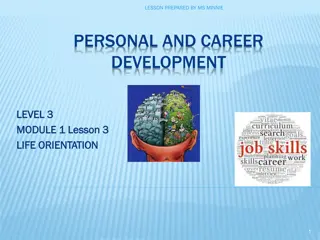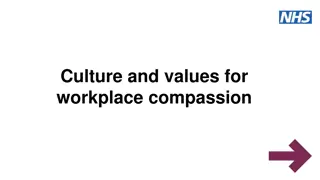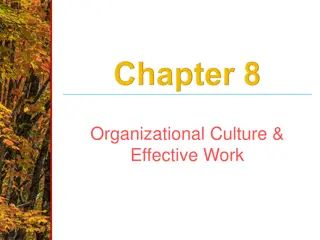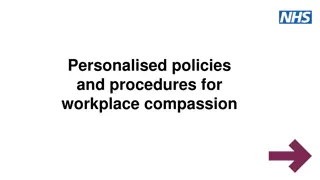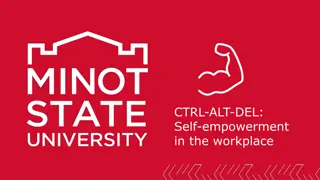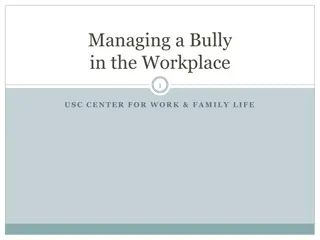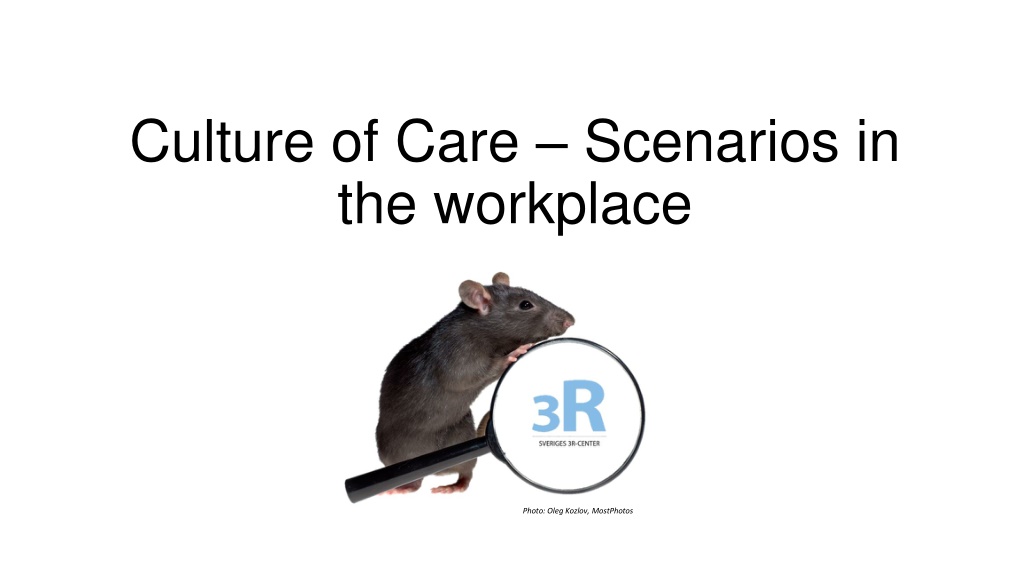
Promoting a Culture of Care in the Workplace
Promoting a Culture of Care in the workplace is essential for creating a positive work environment where respect, consideration, and communication play vital roles. The concept focuses on fostering a climate where employees feel valued, heard, and where both human and animal welfare are prioritized. Through scenarios and discussions, organizations can address challenges and find collaborative solutions to enhance the overall work culture.
Download Presentation

Please find below an Image/Link to download the presentation.
The content on the website is provided AS IS for your information and personal use only. It may not be sold, licensed, or shared on other websites without obtaining consent from the author. If you encounter any issues during the download, it is possible that the publisher has removed the file from their server.
You are allowed to download the files provided on this website for personal or commercial use, subject to the condition that they are used lawfully. All files are the property of their respective owners.
The content on the website is provided AS IS for your information and personal use only. It may not be sold, licensed, or shared on other websites without obtaining consent from the author.
E N D
Presentation Transcript
Culture of Care Scenarios in the workplace Photo: Oleg Kozlov, MostPhotos
What is Culture of care? Our work culture largely influences how we feel in the workplace. Culture of Care is a concept that aims for businesses to be permeated by care and consideration, both between colleagues and towards the animals. It is particularly important to take this into account in laboratory animal facilities, as caring professions, whether it entails caring for humans or animals, often can be both physically and psychologically stressful for those doing the job. Culture of Care is about promoting a positive work climate where everyone feels welcome, respected and heard.
How should this tool be used? The Swedish 3Rs Center has produced examples of scenarios that can arise in a workplace. The aim is to highlight problems and solutions with a focus on Culture of care. These scenarios are intended to create discussion and reflection regarding the reality of your particular workplace and how you can communicate with each other about the work climate, working methods and culture. We have created 25 scenarios, each representing a different problem and potential solutions. The idea is that these can be used as support, where you gather together at your workplace to discuss the various scenarios at regular intervals. For example, you can choose to go through one scenario a week, one every two weeks or as often as you feel is needed in your particular workplace. Feel free to print the material and use the scenarios as a deck of cards where you draw or pick out one card to work with at a time!
Work Work tasks and animal tasks and animal welfare welfare
1. Efficiency A co-worker takes great care when it comes to animal welfare and always use plenty of time when feeding the animals and cleaning their living space. During that time, the co- worker change the enrichments and interact with the animals. This causes the co-worker to do their job a little slower compared to other colleagues. Due to the rest of you being able to get more done in a shorter amount of time, frustration has arisen amongst you and your colleagues. You all believe that it is possible to meet the animals' needs without using so much time and that everyone should strive to have the same workload. How would you communicate you thoughts to your co-worker without hurting their feelings? How can you all create a solution that everyone is happy with?
2. Different points of view You are filling in for a co-worker that is on vacation and discover that they seem to provide significantly less enrichment and bedding material than you and other colleagues do. After pointing this out, they respond saying that the animals do not need more and that they do not use the material very much anyway. You worry that the co- worker does not care about the animals as much as one would like or even does not prioritise these things due to laziness or lack of time, which also make you irritated. How would you bring up your point of view with the co-worker? How can the facility make sure that everyone caring for the animals are in agreement about what the animals need and how they should be cared for? How can you all promote a work environment that is open minded, where everyone feel like they can start conversations about situations like this one?
3. Meeting the legal requirements You are an experienced animal technician that just changed departments. In the new department, you soon notice how the staff is careless with various tasks. Animal records are not updated properly, the animals' spaces are not cleaned sufficiently and hygiene routines are neglected. You know that the animals are doing well and that the staff cares about them, but you suspect that the facility would not be up to code in the event of an inspection by the County Administrative Board. You do not feel comfortable bringing up the issues since you are new and you do not want to step on anybody's toes. Who should you turn to in this situation? How can you bring the problems you have observed up with your colleagues without irritation and disagreements arising?
4. Delayed procedure in an experiment As an animal technician, you are in charge of feeding the animals in a metabolic experiment. You have always done the job correct and take good care of the animals, but one day you overslept. Due to this, the feeding of the animals in the metabolic experiment is delayed by one hour. The researcher in charge gets angry and reports you to the manager, who in turn call you and give you a warning. What would you have done in this situation? Is it fair that you are given a warning or should it have been handled differently? What does the situation say about the culture of the workplace? How do you think this type of situation can be avoided in the future?
5. Lack of routines You are working in an animal room when a researcher enters. You immediately see that they are not following the hygiene routines. The researcher does not use a protective coat, is handling animals without gloves and puts clean material directly on the floor. You know that a failure in the hygiene routines can have major consequences, and in a worst case scenario lead to a lot of animals having to be euthanised, but you do not feel comfortable telling the researcher to follow the rules. What if the researcher gets angry or does not listen to you as an animal technician? How can you handle the encounter with the researcher in this situation? Do you, as an animal technician, feel safe in your authority to tell the researcher what they should do? If not, why? What can be done to reduce the risk of the situation happening again? In your opinion, do managers and other leaders have any responsibility in this situation?
6. Distracted co-worker You are working on a weekend and discover that a co-worker has forgotten to give some of the animals water on more than one occasion. You are not sure how long the animals have been without water, but they seem to be doing well and you quickly provide them with fresh water, making sure that they start to drink. However, the situation makes you frustrated and you know that you have to bring the issue up with your co-worker. At the same time, you do no want to start a conflict or hurt them as you are sure it was not intentional. What is the best way for you to approach your co-worker? How can you prevent a similar situation from happening again? In your opinion, does the manager and other leaders have any responsibility in this situation?
Workload Workload
7. Uneven workload The research groups you work for do a lot of more breeding than the groups your colleagues take care of. Because of that, you have a lot more biopsies to take and young animals to separate from their parents, which you spend a lot of time doing at the end of every week. Your colleagues finish faster and most of them go home when they are done with their work. Due to them going home and not offering to help, you feel like you are not getting the help you want and need. How do you handle an uneven workload between you and your colleagues? Do your colleagues have a responsibility to help you when they are done with their own work? How can everyone handle this type of situation to keep dissatisfaction and discord from arising?
8. Ergonomics You and several of your colleagues have back, shoulder and wrist pain and believe it is due to your department having insufficient ergonomic equipment. On several occasions you have expressed that the management should purchase materials that facilitate the work of the animal technicians. You do not feel that you are being heard, even though you know that these types of aids are available in other departments. What can you as an employee do to get your wishes and thoughts about equipment and ergonomics heard? What responsibilities does the manager and other leaders have in this type of situation?
9. Skills in demand You possess skills that are in particular demand right now. It makes you feel like you have to put in more time and effort helping out than you would like. The workload is high and although it is nice to feel appreciated and needed, you would prefer to do more of your regular tasks. You are afraid to bring this up with your manager and colleagues since you do not want to appear lazy or unwilling to help when needed. How can you bring this up with your manager in a good way? What responsibilities does the manager and other leaders have in this situation? How can you all avoid that some colleagues feel dissatisfaction in similar situations in the future?
10. Heavy workload You can feel how work is piling up and you are getting stressed due to everything that has to get done. You do not feel like you can ask for help as your colleagues have just as much work to do. The researchers you work with become more and more frustrated and express their annoyance at you when the work is taking longer to get done. How can you bring the issue up with your manager? How can you respond to the researchers you work with in this situation? How can routines help in preventing unsustainable workloads in the future?
Attitude and how to treat others Attitude and how to treat others
11. Passively aggressive You have a co-worker who loudly displays their displeasure with other people's efforts. They do this by sighing, making comments that do not seem to be directed at anyone in particular, or saying things like "well, I might as well do it so it s done correctly". You are uncomfortable with these passive aggressive comments and often feel singled out, even if the colleague does not explicitly name you. How can you respond to comments like this in a constructive manner? How can you all promote a work environment where comments like these do not occur and where everyone feels welcome? What responsibilities does the manager and other leaders have in this situation?
12. Raised voices You hear two colleagues argue and raise their voices against each other. You do not know what the conflict is about and you do not want to get involved. However, you feel uncomfortable and is afraid that someone will say something that will affect the mood of the team moving forward. You also consider it very unprofessional that they raise their voices against each other in the workplace where anyone could hear them. What would you do in this situation? As an individual colleague, do you have any responsibility in this kind of situation? How can one move on after an incident like this one?
13. Wrong information You hear a more senior co-worker give incorrect information to a researcher in a private conversation between them. You know that you have the correct information. You do not want to interrupt at the risk of embarrassing your co-worker or seeming rude, but you also do not want the researcher to get things wrong. How would you handle this situation? How would you want a co-worker to act if you were the one accidentaly giving wrong information to a researcher? How can you as a team make sure that everyone always has the correct information moving forward?
14. Inaccessible manager Your manager is not as present in the animal facilities as you would want them to be. Situations often arise where you would like for the manager to step in and give clear directives. Instead, some of your colleagues take control, which creates irritation on your part as they have no real authority. How can you approach your manager to make them aware of the situation? How can you talk to your colleagues if you feel they are acting beyond their authority? How can one promote a culture in the workplace that prevents similar situations from happening in the future?
15. Sceptical colleagues At your place of work, there is an animal welfare group that introduce improvements for the animals, such as new enrichment and new routines. The work is always done together with the veterinarian and based on current scientific studies. The members of the group are often met with a lack of enthusiasm and comments like: "I don't understand why I should change my routine, the animals I take care of are fine, I would see if they were stressed.", "I have been working with laboratory animals for X years, you should have seen the animals in the old days, then they were not feeling well. or "I've been doing this for years, it has always worked great." How can you get the skeptics to feel enthusiasm for changes and get them to work with the group, and not against it? How can an "us against them" situation be countered?
16. Co-worker that blames others You have a co-worker who constantly blame others and who refuse to see their own fault in different situations. The co-worker constantly blames workload, stress and demanding researchers, but you know they do not have a heavier workload than others. You also believe that a lot could be fixed through better planning. You feel frustrated by the co- workers lack of organisation. How would you go about talking to your co-worker about how you feel? How can one help the co-worker to get around the problems?
17. Disagreeable researchers You work with a research group where the principal investigator is quite disagreeable. You feel that the person does not listen to what you have to say or take you seriously. The principal investigator often wants you to prioritise work related to their research and show no regard for you having other commitments. You have lost the desire to work with the research group and no longer feel the same joy in your work in general. How can you go about getting the principal investigator to listen and understand the problem? What responsibility do you as an animal technician have in this situation, and what is the responsibility of the manager and other leaders? How can you as a group increase the understanding between different work roles so that everyone feels like they are heard and respected?
18. Excluding colleagues You are new at work and impressed by all the knowledgeable colleagues. You feel eager to learn from them. However, you also feel like there is some kind of prestige in being technically skilled and that some people do not seem to want to share their knowledge. You feel excluded and find it sad that some people are so uninterested in teaching others. Why do you think the colleagues are behaving this way and what does this situation tell you about the culture of the workplace? Do you as colleagues have a responsibility to tech each other your tips and tricks? How can you as a group avoid similar situations from arising in the future?
19. Disagreement between colleagues You have two colleagues who do not get along. They try to avoid each other at all costs and do not want to work together under any circumstances. They even make sure not to sit close to each other in the break room. This has caused the work group to divide and all colleagues to talk behind each others backs. You feel very uncomfortable with the situation and find it sad that your colleagues' conflict has to spill over on the rest of you. How do you think disagreements between colleagues can be resolved? How can you, as an individual co-worker, make your feelings and thoughts about the situation known? Who should be included when handling this type of situation?
20. The more experienced co-worker You have a co-worker who has worked in the facility for a lot of years. The person considers themselves very competent and is not afraid to express their opinions about how things should be done. You feel that it is difficult to be heard and to express your own opinions and viewpoints as the co-worker often intervenes and "corrects" you. You get annoyed by the co-workers lack of self-awareness and find it difficult to be around someone who always wants to assert themselves, which affects your desire to work and develop in the workplace. How can you bring this up with your co-worker without them getting hurt or it causing a poor work environment? How can you all promote a work environment where everyone feels like they can have their say and where new points of view and experiences are respected and welcomed?
Self Self- -esteem and job satisfaction esteem and job satisfaction
21. Uncomfortable with the task One of the research groups that you work with has asked you to assist with technical service in an experiment. The work involves killing and dissecting many animals and you feel uncomfortable with the task, but do not dare to say so as you would not want to appear unprofessional. You have noticed how euthanasia and invasive procedures are eating at you more and more and is making you feel bad. However, you think it is best to keep it to yourself for fear of being met with criticism and misunderstanding. To whom should you raise your feelings about the work task? How can you respond to a co-worker who expresses such feelings about work? How can the manager and other leaders act to promote a work climate where employees do not feel discomfort and fear when talking about their feelings?
22. Positive feedback You enjoy your work, but feel like everyone in the workplace can do better when it comes to giving each other positive feedback. You think it would contribute to greater development and a more open work climate. However, you do not really know how to bring your wish to the group, since no one else seems to think it is necessary. How would you, as a co-worker, bring this issue to your colleagues and your manager? How could you all promote a work climate where positive feedback is a natural part of your job?
23. Decisions made without you You experience how decisions are being made without you getting a chance to have your say. The decisions directly affect you, your colleagues and the welfare of the animals. You do not feel like your superiors value the opinions and experiences of you and your colleagues. This even though it is you who work with the animals, who know how the daily work is conducted and how new routines can affect the organisation. How would you express discontent to your manager and other leaders in a situation like this? Does your manager and other leaders have a responsibility to include other employees in decisions concerning their work situation? How could you all promote a more transparent culture where everyone feels seen and heard?
24. Uncertainty about a procedure You have been asked to perform a specific type of injection in an ongoing experiment. You have been trained in this type of injection, and are approved, but you feel a little rusty and are worried that you will not be able to perform the procedure correctly. An incorrect procedure would likely harm the animals and affect the research. You want to express how you feel about the task, but are afraid that others will not understand your concern and you do not want to appear as if you cannot do your job. You feel pressured to perform the procedure despite a great deal of uncertainty. How can you, who feel insecure about your duties, bring this up with your colleagues and manager? How can you all help colleagues feel more confident and secure in these types of situations? How can you all help to promote a work climate that minimise the risk of these types of feelings arising amongst colleagues?
25. Unexperienced co-worker You have a new co-worker who is eager to learn and does a good job overall. However, the person seems to have difficulties asking for help where it would have been needed and you discover several mistakes that could have been avoided if you, or someone else, had known about the situation. These mistakes have led to unnecessary suffering for the animals and annoyed researchers. You are afraid that the new co-worker does not dare to ask for help, fearing that they would appear ignorant or nagging. However, you also do not have time to observe everything they do to ensure that it is done correctly. How can you talk to your new co-worker about the issue? Should the new co-worker receive a warning or is it up to the manager and more experienced colleagues to ensure that this type of issue does not arise? How can an introduction and possible mentoring of new employees be designed to make everyone feel secure in their role, and comfortable to ask for help?






